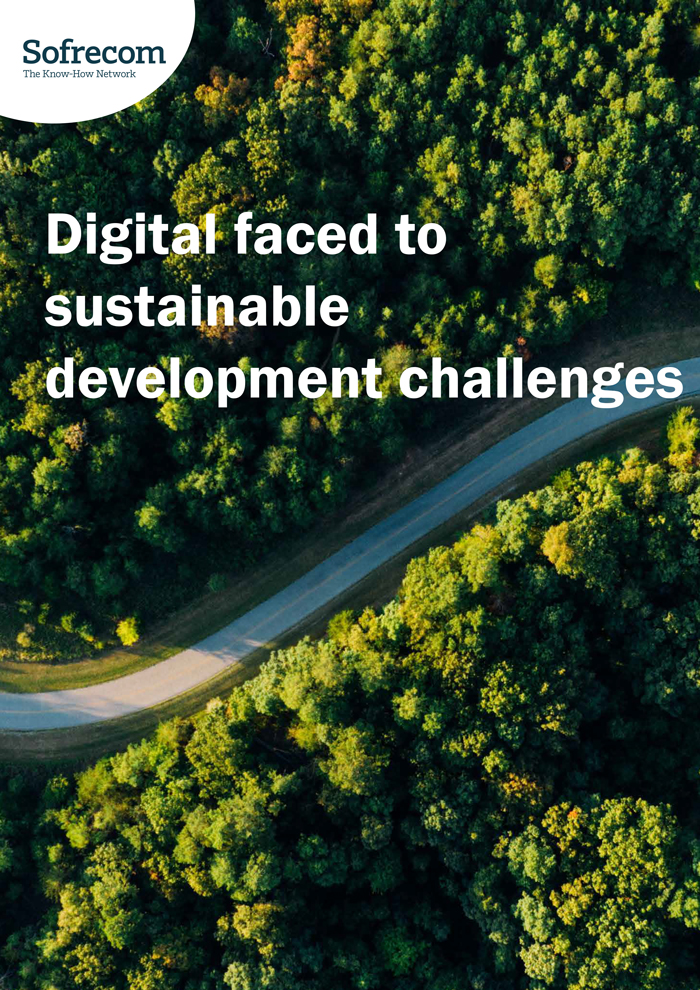
Today, the issue of the environmental transition is on everyone's mind: while the State leads the recovery plan, companies are seeing regulations toughen up and are being forced to make substantial changes. Many citizens are putting the environment at the top of their list of concerns, alongside health and safety.
Digital actors are expected to play an important role by making the sector really work for the environment. But first, they must set an example when it comes to their own environmental impact. This is a challenge for the operators, who are still seeking solutions to control the digital inflation that accompanies technological development.
The path of Digital Sobriety is open to those who are looking to the future.
The perception of the telecoms sector in terms of their environmental impact
Although operators and more generally players in the digital sector have escaped being seen as "big polluters” by the general public, a fate reserved for heavy industry, they are increasingly being singled out, particularly by non-governmental organizations (e.g. Shift Project, Green IT, etc.). Less than half of French people currently believe that the telecoms sector is environmentally friendly (Harris 2020 survey for the French Telecoms Federation).
As it also drives progress and is an essential tool for maintaining economic and social life during the crisis, it is important that digital technology preserves its positive image. The operators are aware of this. They are making commitments to reduce their carbon footprint and relying heavily on the circular economy, as they implement strategies focused on energy efficiency (network infrastructure, data centers, buildings, fleets, etc.) and renewable energy (purchasing and even producing it).
Despite this, given the arrival of new technologies such as 5G, the explosion of new devices enabling people to benefit from them, and the emergence of new services and uses leading to an increase in traffic, these measures may prove insufficient. This is why the operators and digital players are looking for ways to strengthen their existing initiatives and minimize any negative externalities.
Digital Sobriety: a solution to adopt
Recently, Digital Sobrietyhas been one of the solutions for companies and consumers being promoted by the public authorities (ADEME, ARCEP, the Senate, etc.). The former are invited to “commit to a kind of sobriety” in their digital lives. On its website, ARCEP has just published an initial list of “actions” to limit its digital environmental footprint:
- turn off your router when you’re out or at night,
- download only the apps or videos that really interest you,
- reduce the use of videos when possible
- limit attachments and periodically clean out your email inbox.
The concept of Digital Sobriety is not new. Based on well-established, even ancient considerations and values, it has remained current across the centuries and took on a new life as part of the ecological and social critique that emerged after the 1930s. Focused on moderation in the production and consumption of products and services in order to minimize their environmental impact, Digital Sobriety has strong potential to support the effects of energy efficiency, with which it is often confused. Whereas the latter makes it possible to reduce the level of energy consumption solely through more efficient production, sobriety makes it possible to go further by acting at the level of end use. Not only is a device less energy-intensive (=efficiency), it is also used less often (= sobriety). Digital Sobriety encourages the moderate and reasonable use of digital technology, based prioritizing products and services that meet a real or essential need, from the production stage through to their end use.
Accepting this prioritization and knowing how to enact it is not easy for consumers, who are used to consuming for entertainment or to assert their status, and are constantly stimulated by marketing campaigns that encourage them to buy more and more. Forcing them into sobriety would be a bad idea because they might well feel deprived of their freedom. However, when it comes in the form of a conscious choice on their part, social psychology studies (e.g. work by Kate Laffan, London School of Economics) have shown that engaging in behavior that positively impacts the environment and others provides a powerful feeling of happiness and even gives meaning to people’s lives. This is where companies and the State have an important role to play in helping consumers make this choice:
- by showing them that the option of “sober consumption” exists, explaining what it means and demonstrating that everyone can act,
- by setting an example, applying a sober approach during production. The companies’ actions are all the more important because most of the effort falls to them (and not consumers),
- This involves offering products and services that are “sober by design”, and also limiting incentives to purchase except to fulfill essential needs.
The benefits of Digital Sobriety for digital companies
With the help of companies and the State, consumers will be able to gradually move towards a new, more virtuous and more meaningful way of life.
So what would digital companies gain from adopting and promoting Sobriety? How can we justify this profound change, which will affect their economic model? What sustainable alternative value would offset the reduction in sales volumes?
There are many avenues focused on optimizing production and operating costs, or creating new value by, for example, monetizing simpler, high-quality offers that make it possible to consume "less and better”, creating new sober services with benefits based on an experiential approach, adopting an economic model based on pooling and sharing, etc.: All of this is opening up to operators and deserves their attention.
For companies, embarking on the path of Sobriety today means preparing to operate (and continue to exist) in the world of tomorrow - a world where resources will be scarce and costly, where consumers will be uncompromising when it comes to the values of their suppliers and the “meaning” behind the products and services they will be offered.
In the post-Covid world, where investors will be even more ready to reward companies who can reconcile financial and CSR success, sobriety will be a visionary and pragmatic choice.





